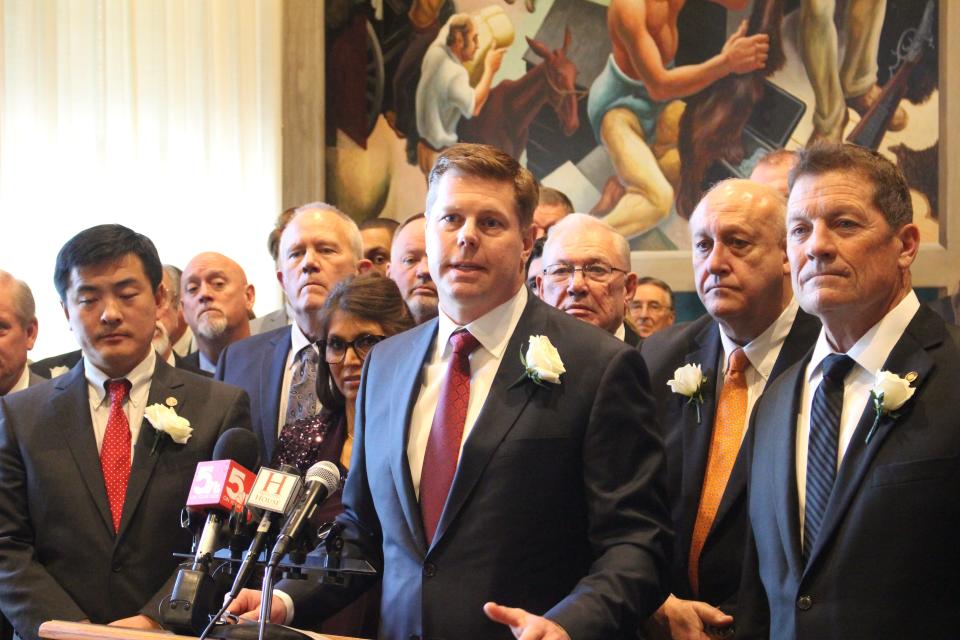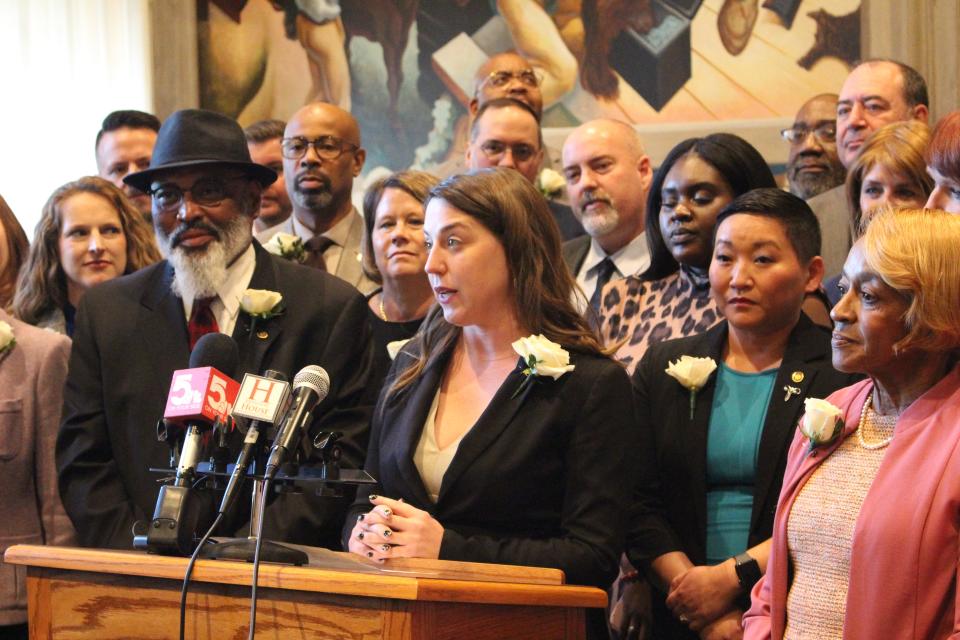Missouri lawmakers can't agree who deserves scrutiny for new school performance data
When Missouri's education department released their annual report cards on public school districts last week, officials urged families, schools and the public to exercise caution while analyzing them.
The state's education commissioner emphasized that the state's new annual performance review used new metrics this year, saying to "focus less on the APR score and more on the underlying data." And the director of the Missouri Association of School Administrators called it a "snapshot" that "needs to play out over time to see exactly where we are."
But that didn't stop state lawmakers in Jefferson City from expressing strong concerns over various aspects of the reports in the days after they were released, as members questioned both the efficacy of some districts and how the department evaluated the districts.

The annual performance reports come at a key point halfway through the legislative session, as the Republican-controlled General Assembly zeroes in on public schools while considering a variety of bills that would expand educational options outside of those districts. Democrats, meanwhile, are dubious about the new metrics being used to evaluate those schools, calling DESE's methods into question while continuing to push for raises for teachers and more money for public education.
Far fewer schools scored among the highest category under the new scoring method — just four districts hit that mark for the 2021-22 school year, compared to 320 districts four years earlier. The bulk of districts landed in the "average" category overall.
More:New report cards for Missouri schools show 'impact' of teacher shortage, pandemic
Speaker of the House says results are 'appalling' as Republicans push for school choice measures
"I think it's appalling that so many schools are failing," Speaker of the House Dean Plocher, a St. Louis Republican, told reporters, the same week the House approved legislation that would allow students to attend districts outside of the one assigned to their residential area.
"I think parents should have choices, I think children should have choices and children should be challenged," Plocher said. "Teachers should be rewarded and given the resources that they need to teach. So I think we made progress this week."

Republicans see the new performance scores as further justification to advance legislation expanding school options — which includes the open enrollment plan now heading to the Senate. It remains to be seen whether any of those bills, including others that would expand a 2021 tax credit program granting some families K-12 scholarships, will see significant progress this year.
"This unfortunately is not a new trend, but the culmination of years of decline," Senate President Pro Tem Caleb Rowden of Columbia wrote on social media about the data. "We must be more interested in educating kids & empowering parents than protecting the educational status quo that is clearly failing Missourians."
Springfield Public Schools, the largest district in Missouri, earned 73.7% of the available points under the reworked evaluation criteria — outperforming most of its "benchmark" districts but scoring lower than many of its suburban neighbors.
Rep. Alex Riley, a Springfield Republican, said he was "disappointed" with SPS' results, and that the solution was not just to send more dollars to districts.
"I think that shows we can't just try and solve the problem with lack of educational attainment in our public schools by pumping more money into the system," Riley said. "We need to look at other options as well. And that would include increasing the school choice options for families."

Another Springfield Republican, Rep. Melanie Stinnett, met with SPS superintendent Grenita Lathan this week after saying "it's important to have open conversations" about the direction of education.
"I was supportive of the open enrollment bill and will continue to be supportive of educational options for my constituents and others throughout the state," Stinnett said. "But I also think it's important that we have conversations with our public schools and find out what their needs are, and help support them. I think a lot of that probably looks like teacher pay and other teacher retention type of increases."
For subscribers:Missouri's legislative session is halfway over. What Springfield lawmakers think so far
Democrats scrutinize DESE, performance of charter schools
Democrats, who have pushed for increased investment in public schools and mostly stand opposed to the expansion of charter schools or non-public options, turned the focus to Missouri's education department and the performance of charter schools after the performance scores released.
House Minority Leader Crystal Quade of Springfield, asked about the scores, pointed to charter schools in Missouri that are provisionally accredited or unaccredited, calling it "an important part of this conversation." The open enrollment plan passed by the House last week would not allow direct transfers to charter schools, but Quade warned it could "open Pandora's box."
"I do think that open enrollment is step one, and Republicans have actually said this before," Quade said. "Open enrollment first, charter school second."
She also questioned the new metrics being used by the Department of Elementary and Secondary Education.
"We have a lot of concerns about the scoring mechanism, we have a lot of concerns with where DESE is currently at," Quade said. "But for this to be pivoted into any sort of conversation of 'oh, we need more school choice, our public schools are failing,' the numbers alone don't support that."

She urged lawmakers to have "an actual conversation" about how teachers and schools are graded, and what student testing looks like, as well as continue to push for raises for teachers to retain the educational workforce.
The commissioner of education has said lower scores reflect in part the challenges imposed on schools by COVID-19, some of which linger in classrooms and homes. Rep. Stephanie Hein, a Springfield Democrat, expressed a similar sentiment.
"It's the first time we've had an assessment model come out since the pandemic, and I'm not surprised we saw dips," Hein said. "It's just figuring out, how do we navigate that challenge, to get the scores back up where we want that to be? Sometimes that's through financial resources, sometimes that's through processes and procedures. It's not a one-size-fits-all kind of solution here."
Rep. Betsy Fogle, another Springfield Democrat, said she had "questions about those metrics that are being used" by DESE, but also said proponents of school choice should acknowledge the subpar performance of some charter schools under the new system.
"I think that's what the question boils down to, is are both sides willing to use this as a metric that we're going to use to forecast the future of education in this state?" Fogle said. "If so, that's a conversation we'll have. Or are both sides ... going to agree that this isn't the best metric, and we need to figure out what that looks like."
Democrats aren't the only ones who have lobbed complaints toward DESE in recent months; Republicans, too, have been critical of the department's bureaucracy and called for changes to how schools operate and are overseen.
Rowden, the Senate president pro tem, in his opening remarks this session called for lawmakers to "redefine" education in the state, urging for "world-class" teachers and students to be treated as such. And Rep. Doug Richey, an Excelsior Springs Republican who chairs the legislature's joint education committee, wrote on social media Thursday that the department is "a problem for a number of reasons," and said lawmakers could "weaken DESE first by freeing families from arbitrary bureaucratic structures."
Galen Bacharier covers Missouri politics & government for the News-Leader. Contact him at gbacharier@news-leader.com or on Twitter @galenbacharier.
This article originally appeared on Springfield News-Leader: MO lawmakers criticize districts, testing metrics in wake of new data

